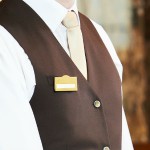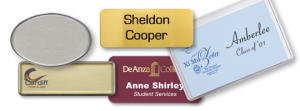In expansion on the topic of impressions of a name tag, many have been talking about whether or not it is important for those in service positions to identify themselves by wearing a name tag or name badge. Stefan Hiller, founder of Sky Touch; Global Hotel Security Consulting, has provided a security point of view on the topic.
 “I think it is important that staff can clearly be distinguished from guests. While general staff in uniform is a big help, name tags completes identification and adds a personal touch,” Hiller states.
“I think it is important that staff can clearly be distinguished from guests. While general staff in uniform is a big help, name tags completes identification and adds a personal touch,” Hiller states.
In Hiller’s article, titled No name tags; a forward or backward step?, he suggests that by not wearing a name tag in a service position lessens the quality of the customer/consumer experience. While his article is based in the hotel industry, many things that he discusses can also be looked at in any service position.
Name tags and name badges not only provide this personal touch, but they also provide that much needed personal identifier. By using personal identification, a hotel or any other retail establishment, gives a sense of security to not only the consumer, but also to the employee.
Hiller provides the following anecdote.
 “Twenty years ago when I was an apprentice, I remember we were always told by the maître d’hôtel to wear our name tag for quality purposes. ‘Apprentice’ was written underneath my name. (While) we, the apprentices, gained our first experiences as service staff and were by no means fully trained yet, the name tag signaled that we were still a staff member in training, and in most cases guests had sympathy and excused little mistakes.
“Twenty years ago when I was an apprentice, I remember we were always told by the maître d’hôtel to wear our name tag for quality purposes. ‘Apprentice’ was written underneath my name. (While) we, the apprentices, gained our first experiences as service staff and were by no means fully trained yet, the name tag signaled that we were still a staff member in training, and in most cases guests had sympathy and excused little mistakes.
“From a marketing point of view, it reflected also that the hotel invested in young people, which certainly provided a positive image. Without the apprentice name tag, guests would not know if a staff member was still in training or not. Wearing our name tag protected us from high expectations of guests. Guests found it easier to use our name when having a conversation. It also helped us to identify ourselves with our new job.”
“Personally, I see no benefit in not using name tags,” states Hiller. “I have seen it produce unwanted guest frustration. Not using name tags lowers the quality of service and contributes to unwelcome risks.”
Name tags, name badges, lanyards and any other form of personal identification are much needed parts of any uniform. Make them part of yours today by visiting www.nametag.com.





